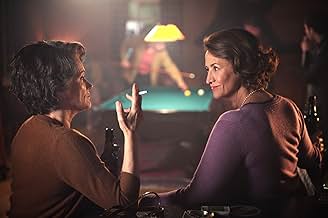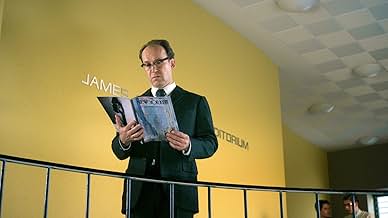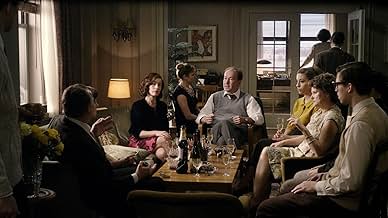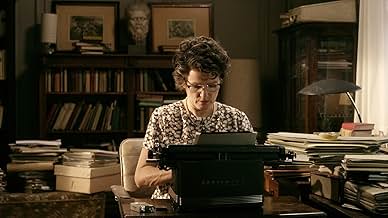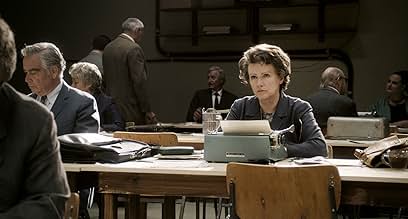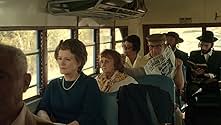Ein Einblick in das Leben der Philosophin und politischen Theoretikerin Hannah Arendt, die für den New Yorker über den Prozess des Nazi-Kriegsverbrechers Adolf Eichmann berichtete.Ein Einblick in das Leben der Philosophin und politischen Theoretikerin Hannah Arendt, die für den New Yorker über den Prozess des Nazi-Kriegsverbrechers Adolf Eichmann berichtete.Ein Einblick in das Leben der Philosophin und politischen Theoretikerin Hannah Arendt, die für den New Yorker über den Prozess des Nazi-Kriegsverbrechers Adolf Eichmann berichtete.
- Regie
- Drehbuch
- Hauptbesetzung
- Auszeichnungen
- 8 Gewinne & 18 Nominierungen insgesamt
- Student Laureen
- (as Leila Schaus)
Empfohlene Bewertungen
Arendt left Germany in 1933 for France, but when Germany invaded France, she found herself in a detention camp. When the film begins, she is a happily married woman with friends such as the writer Mary McCarthy, and she is a professor at, among other places, the New School in New York City.
Hanna is very excited about covering the trial, but her husband, Heinrich, is afraid it will take her back to those dark days.
While observing Eichmann, Arendt is struck by the fact that he was an ordinary man with nothing special about him. This causes her to think about the nature of evil itself.
She decides that he's not a monster but a person who suppressed his conscience in order to be obedient to the Nazis. She thus created the concept of the "banality of evil."
She believed also that some Jewish leaders at the time had fallen into this trap and unwittingly participated in the Holocaust. Her critics failed to understand her meaning.
In some camps, her New Yorker articles were not well received, as she was seen as a heartless turncoat who blamed the victims. Hanna has to defend her ideas, and the price she pays for them is high.
Barbara Sukowa does a magnificent job as Arendt, showing the woman's brilliance, courage, affection for friends and family, and hurt when some people she loved turned against her.
It's surprising that she was met with as much disdain as she was -- but Arendt did not believe in blind adoration of any group. She took people on an individual basis.
As far as the banality of evil, evil has always had the ordinary face of people sitting back and doing what they're told. Or, as Martin Luther King said, doing nothing.
I'm sure many of us have experienced this in the workplace -- I know I did. It's then that you realize the true nature of most people. Everyone can say they have ethics - but do they have ethnics when they stand to lose something?
Beautifully directed by Margarethe von Trotta, who also co-wrote the screenplay. A difficult subject made clear, a complicated woman understandable -- no small feat. A thought-provoking film.
As a piece of film-making, however, HANNAH ARENDT grabs the attention and does not let go throughout its 113-minute running- time. As portrayed by Sukowa, Arendt comes across as a forthright person, not frightened of expressing her opinions and responding to any intellectual challenges from close friends such as Kurt Blumenfeld (Michael Degen). Yet beneath that tough surface lurks a profoundly disillusioned person, as she discovers to her cost that her great teacher and mentor Martin Heidegger (Klaus Pohl) does not practice what he preaches. Although insistent on reinforcing the distinction between "reason" and "passion," Heidegger takes the "passionate" decision to associate himself with the Nazi party, and thereby embraces their totalitarian values. Like Eichmnann himself, he chooses not to "think" but to commit himself to an ideology that actively discourages individual thought.
The sense of shock and disillusion Arendt experiences inevitably colors her view of the Eichmann trial. Director von Trotta includes several close-ups of her sitting in the press-room listening to the testimony of Eichmann, his accusers and the witnesses, a quizzical expression on her face, as if she cannot quite make sense of what she hears. She cannot condemn Eichmann, because he has simply followed Heidegger's course of action.
Once the articles have been published, Arendt experiences an almost unprecedented campaign of vilification. Although she is given a climactic scene where she defends herself in front of her students (and her accusers within the university faculty), we get the sense that she is only doing so on the basis of abstractions; her personal feelings are somehow disengaged. She is far more affected when her one-time close friend Hans Jonas (Ulrich Noethen) vows never to talk to her again on account of her views. Philosophers might be able to make sense of the world, but they often neglect human relations.
Consequently our view of Arendt, as portrayed in this film, is profoundly ambivalent. While empathizing with her views about the banality of evil, which reduces people to automata as they claim they were only carrying out orders, even while being involved in atrocities, Arendt herself comes across as rather myopic, so preoccupied with her ideas that she has little or no clue about how they might affect those closest to her. It's a wonder, therefore, that Mary McCarthy (Janet McTeer) chooses to stick with her through the worst of circumstances.
Ingeniously combining archive footage of the Eichmann trial with color re-enactments of what happened during that period, HANNAH ARENDT is a thought-provoking piece, even if we find it difficult to identify with the central character.
The film stars Barbara Sukowa as Arendt, who was one of he leading intellectual thinkers of the 20th Century. Arendt's history reads more like fiction than non-fiction. As discussed in the movie, she studied in Germany under the great philosopher Heidegger, was imprisoned in a Nazi internment camp in France, from which she escaped, came to the U.S., and taught at some of the finest universities in our country.
The movie concentrates on the furor that arose after Arendt wrote about the Eichmann trial for The New Yorker. (These articles were later published as a book.) Arendt brought forth her theory of the banality of evil in these articles. Her point was that an evil person like Eichmann was not a monster, but rather a person who has renounced his ability to think, and therefore has renounced his status as a human being.
Arendt believed that Jews who accepted a modicum of authority from the Germans contributed to the Holocaust, because without the Jewish leaders to maintain order, there would have been more chaos and less killing of Jews.
This latter belief made people furious, because it suggested that the Jews were partially responsible for their own fate. This is hard enough to hear now. You can imagine how it was received in 1961, less than 20 years after the Holocaust.
One weakness of the film is that the script suggests that "everyone" was talking about Arendt's writing. Then, as now, the intellectuals of the Upper West Side of Manhattan did not represent a true sample of the U.S. population. Many people were aware of the Eichmann trial, but Arendt's writings passed unnoticed by most people.
Another weakness is that characters in Arendt's life are introduced once, and then never again. If you miss the names the first time, you'll just have to live without knowing who was whom. That's not so bad, because you can accept Barbara Sukowa as Arendt. Everyone else in the film revolves around her.
If you're interested in the Holocaust and in 20th Century philosophy, the film is a must. Even if those topics aren't important to you, the movie is compelling as a study in human behavior and human interactions. We saw the film at the Rochester Jewish Community Center as part of terrific Rochester Jewish Film Festival. If it's available on DVD or at another festival, I recommend that you see it.
If that's what director Margarethe von Trotta had in mind when making this film, she succeeded. Her film documents an important chapter in the story of Arendt's life: her articles about the Eichmann trial in Jerusalem, and the ensuing tsunami of negative reactions. The reason for those negative reactions was the way Arendt regarded Eichmann: not as a monster, but as a man 'incapable of thinking', a dimwit who just followed orders. This fitted her theory of 'the banality of evil': the worst kinds of evil are often the result of not thinking for oneself.
Veteran actress Barbara Sukowa portrays Arendt as a difficult and complex woman, who is a brilliant philosopher but also stubborn, arrogant and single-minded. In one scene, we see her lying on a couch, when the phone rings. On the other end of the line is her editor, who faces a deadline and asks if she is making progress with the articles. 'Of course I'm working hard, and it would be nice if I could continue working instead of chatting on the phone', she answers. After that, she returns to the couch, lies down and continues smoking her cigarette.
Sometimes it seems that Arendt is incapable of feeling, just as Eichmann is incapable of thinking. Even when her best friends turn away from her, she continues insulting them by telling them 'she doesn't love the Jewish people'. She means it in a philosophical way - you can't love a people the way you love individuals. But nevertheless, it comes across as cold-hearted and insensitive.
Arendt is clearly an interesting person. But that doesn't make 'Hannah Arendt' an interesting film. From a cinematographic point of view, the movie doesn't have much to offer. It's a rather straightforward account of this episode in Arendt's life. The only thing that adds a little depth to the film are the flashbacks of the romantic affair she had with her teacher, the famous philosopher Martin Heidegger, who sympathized with the Nazis. The film suggests that this affair influenced the way she regarded Nazis such as Eichmann, but doesn't make this explicit. In my view, the film is interesting as a history lesson about this remarkable woman, but not as a great cinematographic experience.
All that said, and these are certainly ideas worth mulling over, this is a film for ideas and for philosophy buffs, not for film buffs. Why do I say this? Because this movie is slow, at least for American audiences. The beginning is confusing. We see a woman in New York but we don't know the date. She speaks German. We see a man get off of a bus heading to "Victoria" in the middle of nowhere. He is promptly kidnapped. We don't know when or where. Eventually, we learn the kidnapped man is Adolph Eichmann who is nabbed by the Mossad in Argentina in 1960. Much of the movie unfolds slowly. This is a film about thinking. It is not about doing much or feeling much. It is an intellectual film.
There's one semi-action scene in the film where a 1950s vehicle corners Arendt on the road where she is walking. Israeli secret agents pour out of the car and threaten Arendt, trying to prevent her from publishing her book about Eichmann. Based on someone knowledgeable, Professor Roger Berkowitz, academic director of the Hannah Arendt Center for Politics and the Humanities at Bard College in New York, it appears this scene was invented out of whole cloth to try to give the film at least some suspense. But that's not what this film is about.
It's about thinking and it's about the fearsome, word-and-thought-denying banality of evil and how Hannah Arendt was the first to identify this 20th-century pathology of the human psyche.
Thanks to the Camera Cinema Club in San Jose for showing this film.
Wusstest du schon
- WissenswertesFor a deeper understanding of this story, one might care to watch Operation Finale (2018), which depicts the undercover mission to find and extract Adolf Eichmann from Argentina and bring him to trial in Israel. Showing the background of an operation sanctioned by PM David Ben-Gurion, the film gives a glimpse of the complexity of Eichman's character, his futile attempts to justify his actions and tell his side of the story.
- PatzerWhen Arendt stands on the terrace of her hotel in Jerusalem at looks across the Valley of Hinnom at the Old City, there are Israel flags flying from the Tower of David complex. However, the Old City of Jerusalem was still under Jordanian control in 1961.
- Zitate
Hannah Arendt: You describe a book I never wrote.
Siegfried Moses: A book that will never be allowed in Israel. And won't appear anywhere else either if you have any decency left.
Hannah Arendt: You ban books, and lecture me about decency!
- VerbindungenFeatured in Kino Kino: Hannah Arendt (2013)
Top-Auswahl
- How long is Hannah Arendt?Powered by Alexa
Details
- Erscheinungsdatum
- Herkunftsländer
- Offizieller Standort
- Sprachen
- Auch bekannt als
- 漢娜鄂蘭:真理無懼
- Drehorte
- Produktionsfirmen
- Weitere beteiligte Unternehmen bei IMDbPro anzeigen
Box Office
- Bruttoertrag in den USA und Kanada
- 717.205 $
- Eröffnungswochenende in den USA und in Kanada
- 31.270 $
- 2. Juni 2013
- Weltweiter Bruttoertrag
- 8.880.936 $
- Laufzeit
- 1 Std. 53 Min.(113 min)
- Farbe
- Sound-Mix
- Seitenverhältnis
- 2.35 : 1





